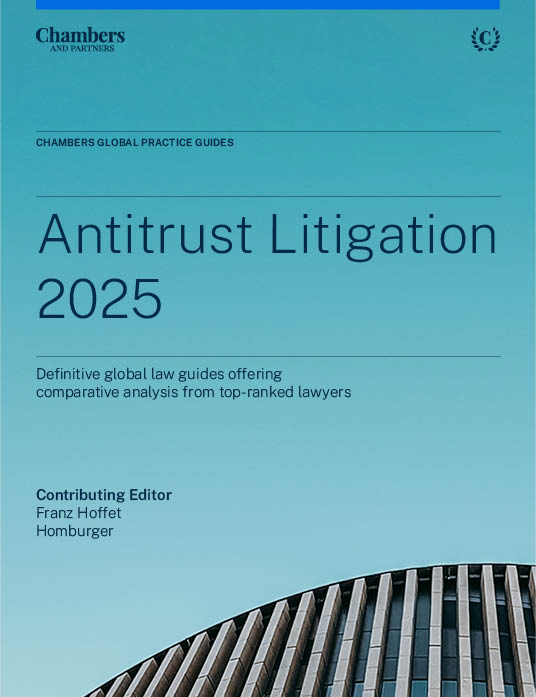
Antitrust Litigation 2025
The Antitrust Litigation 2025 guide covers over 20 jurisdictions. The guide provides the latest legal information on the legal framework for private antitrust litigation, the basis and procedure for a claim, limitation periods and defences, class and collective actions, disclosure procedures and the role of expert witnesses, joint and several liability, litigation funding and costs, and appeals.
Last Updated: September 18, 2025
Compare law and practice by selecting locations and topic(s)
Select Locations

Select Topic(s)

Please select at least one location and one topic to use the compare functionality.
Global Overview – Antitrust Litigation in 2025
Major international law firms with antitrust specialist teams expect the rise of private antitrust litigation to continue in 2025. In some of the more important jurisdictions such as the US, Europe and the UK, the focus will be on digital markets where private antitrust litigation before national courts has become a key enforcement element in addition to regulatory investigations. In particular, large tech companies have become the target of private claims, even more so since new digital regulatory regimes (eg, EU DMA and UK DMCC) facilitate follow-on and standalone damage claims. The most recent example of such claims against tech platforms is one brought by several thousand European hotels against Booking.com for damages suffered as a consequence of the platform’s allegedly excessive commission rates. While traditional abuse of dominance arguments still prevail, new innovative theories of harm, including consumer, data protection and environmental claims are now brought forward by plaintiffs in private antitrust litigation.
In many jurisdictions, the expectation of significant returns has increased the willingness of investors to finance litigation funding. Major cartel follow-on damage cases have benefited from litigation funding and it is expected that this trend will continue and expand internationally. Courts, such as the British Competition Appeal Tribunal (CAT), have recognised the necessity of funding for plaintiffs to be able to bring collective proceedings and have clarified that it lies within the courts’ power to allocate a portion of the damages awarded to a litigation funder’s fees.
In Asia, the development of private enforcement is still in an early phase, with Japan experiencing an increase in the number of competition damage claims. These are mostly follow-on cartel damage cases brought after decisions by the Japan Fair Trade Commission. In Japan, there have also been damage claims against directors of companies as a consequence of the companies’ decisions not to apply for leniency.
Private antitrust damage litigation is picking up even in jurisdictions without developed class action systems. As an example, a group of retail merchants in Switzerland has recently sued Mastercard and Visa for damages in the amount of CHF142 million. The claim is based on the argument that interchange fees are no longer justified by economic grounds, despite recent amicable settlements between the Swiss Competition Commission, Mastercard and Visa which implicitly recognise the economic need for interchange fees.
Finally, as competition regulators have increasingly investigated restraints in labour markets, private antitrust litigation now also seems to develop a new focus in this area, particularly with respect to no-poach agreements.
Plaintiff-Friendly Court Decisions in Europe
Europe has seen a number of plaintiff-friendly decisions by the European Court of Justice (ECJ) and other European courts over recent months.
For example, in Heureka v Google the ECJ had to clarify the application of Article 10 of the Damages Directive on limitation periods. Heureka, a Czech online comparison services company claimed damages from Google in a Czech court in the aftermath of the EU Commission’s 2017 decision on Google shopping. In its Heureka v Google decision, the ECJ clarified that the limitation rules in the Damages Directive do not apply retroactively. The ECJ had to decide whether the Czech time limit of four years had already elapsed before the Czech Republic had adopted the Damages Directive after the 2016 transposition deadline. The ECJ took a plaintiff-friendly view and reaffirmed the requirements set out in its Volvo decision. It concluded, applying its earlier cessation criteria, that the Czech limitation period could only have started to run after 2017 when the Commission considered that Google’s alleged abuse of dominance had ended. With respect to the knowledge requirement, the ECJ stressed that the victim must know sufficient information to be able to bring an action for damages. According to the ECJ, that moment occurs at the date of publication of the summary of the Commission’s decision in the EU Official Journal.
Another plaintiff-friendly trend can be observed in the decisional practice of national courts with respect to the estimation of damages. Recognising the difficulty for plaintiffs to prove damages suffered as a consequence of anti-competitive conduct, the Spanish Supreme Court in a truck cartel case has confirmed its competence to estimate the quantification of the harm suffered due to the “practical impossibility of assessing the harm” for the plaintiffs. This was particularly the case where the impossibility to quantify the harm arose from the geographical scope of a cartel, its duration and the complexity of the products. This made it difficult to determine an appropriate counterfactual scenario. The Spanish Supreme Court went on to refer to the practice of other European courts, including the CAT, when it came to estimating damages. The Spanish Supreme Court held that since the minimum foreseeable damage had been “prudently set by most courts at 5% of the cost of the trucks”, this should be the starting point of its estimation.
Another example of plaintiff-friendly court decisions are recent rulings by German courts which will make it easier for victims of competition law infringements to enforce their claims in German courts by assigning them to special purpose vehicles (SPVs) which then litigate the assigned claims as a sole plaintiff. In 2021 and 2022 already the German Federal Court of Justice held that the assignment of multiple claims to an SPV does not generate a conflict of interest. Under the German Legal Services Act (the RDG; which serves to ensure that legal services are only provided by qualified individuals and entities) entities which are not law firms are required to obtain a special licence before providing collection services. The RDG was amended in 2021 to expressly allow registered legal service providers to assess claims. In 2024, two German courts of appeal held that legal services providers’ qualitative assessments of antitrust damages claims are covered by their collection licence under the RDG. The two cases concerned both a follow-on and a standalone claim. The German Federal Court of Justice still must issue a final judgment on whether the combined enforcement of antitrust damages complies with the RDG. A plaintiff-friendly decision is expected in light of the ECJ’s guidance. The ECJ held in a case referred by the Dortmund regional court, that national rules preventing victims from assigning antitrust damages claims to a legal service provider for collective enforcement – even in cases without a binding infringement decision by a competition authority – would violate the effectiveness principle unless the national law provides an alternative mechanism for bundling individual claims and the pursuit of an individual damage would be impossible or excessively difficult.
Yet another example for the ECJ’s plaintiff-friendly stance is a recent decision in which it held that a parent company can be sued in its place of residence for damages suffered by a private plaintiff as a consequence of a subsidiary’s antitrust infringement in a different member state. In 2014, Heineken’s Greek subsidiary was fined by the Greek Antitrust Authority for unlawfully forcing wholesalers and distributors to favour its brands. In 2017, a competitor of Heineken’s Greek subsidiary brought a follow-on action in the Netherlands where Heineken’s parent company is domiciled, against both Heineken and its Greek subsidiary, seeking damages. The Dutch Supreme Court referred the question of jurisdiction to the ECJ. Under the applicable provision of the Brussels Regulation (Article 8 (1)), if there is a close connection between claims in an international context and a risk of irreconcilable judgments arising from separate court proceedings, the defendants can all be sued before the court in the country where one of them (the so-called anchor defendant) is domiciled. The ECJ applied the approach of the European Commission when imposing fines for breaches of EU Competition Law and found that the parent company can be sued in its home country as long as it has decisive influence over the subsidiary which has committed the competition law infringement unless the subsidiary decides independently on its own conduct in the market. Under new case law there is a presumption that decisive influence is exercised where the parent holds all or almost all of the capital in the subsidiary.
Focus on Tech Companies in the USA
Similar to in the EU – where thousands of hotels have filed a damage claim against the OTA platform Booking.com for excessive pricing – platforms are under pressure in respect of private litigation in the US as well. For example, Apple is being sued for allegedly illegal restraints in competition in its app store distribution and billing services. A new claim has been brought by a consumer class for alleged monopolisation of app distribution resulting in overcharges on IOS apps and in-app purchases. Another platform-related litigation has been brought against the electronic medical records provider Epic Systems. It is alleged that Epic Systems is foreclosing competition in platform markets for platforms which allow health insurances to access and analyse medical record information. Allegedly, Epic Systems is pressuring insurance companies which use its medical record system to stop using competing platforms.
A new trend in the US concerns challenges of mergers by private antitrust litigation. For example, a private consumer class has sued T-Mobile with respect to its merger with Sprint. The class alleges that the acquisition permitted all cell phone providers to raise their prices. The consumer class not only claims damages but also seeks to unwind the merger and create another competitor. Similarly, private plaintiffs have challenged the merger between Alaska Airlines and Hawaiian Airlines although – as in the case of T-Mobile – the transaction has already been cleared by the Department of Justice.
Finally, in the US a new trend with respect to court approval of settlements seems to be developing. District courts have recently rejected proposed class action settlements. For instance, in a case regarding payment card fees charged to merchants, a settlement proposed by the parties has been rejected by the court which found the proposed settlement amount of USD30 billion to be insufficient. It appears that federal courts are increasingly willing to more deeply scrutinise settlements in antitrust class actions.
